Module 5 Lao She Teahouse. Unit 3 课件 (外研版八年级英语上册)
文档属性
| 名称 | Module 5 Lao She Teahouse. Unit 3 课件 (外研版八年级英语上册) |

|
|
| 格式 | pptx | ||
| 文件大小 | 2.8MB | ||
| 资源类型 | 试卷 | ||
| 版本资源 | 外研版 | ||
| 科目 | 英语 | ||
| 更新时间 | 2023-10-06 00:00:00 | ||
图片预览

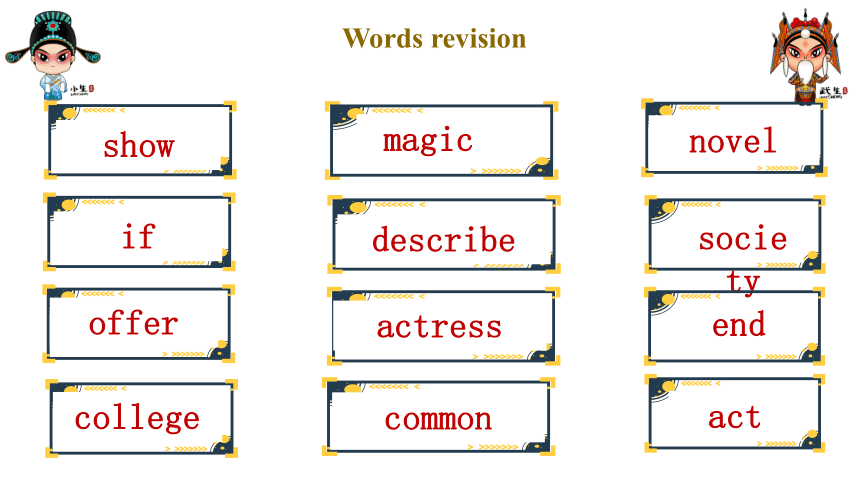
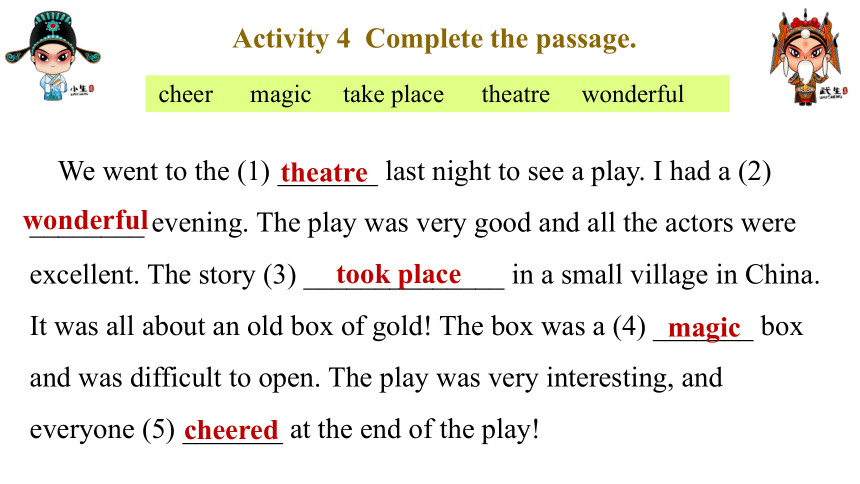
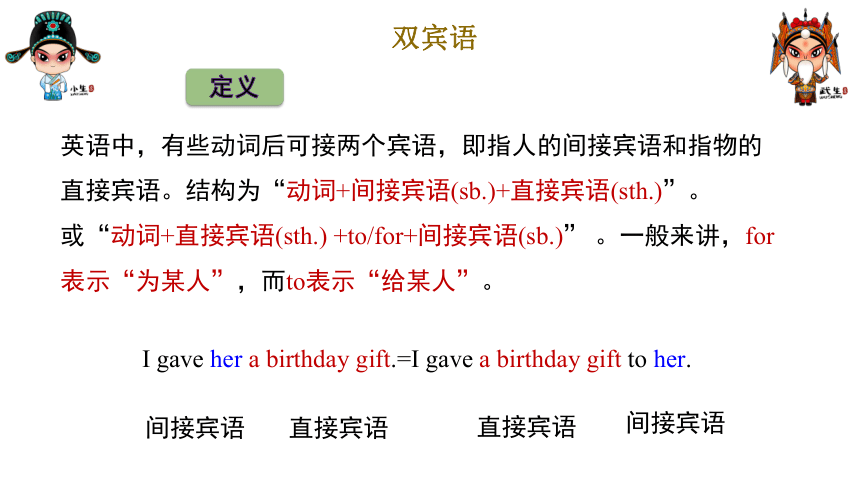
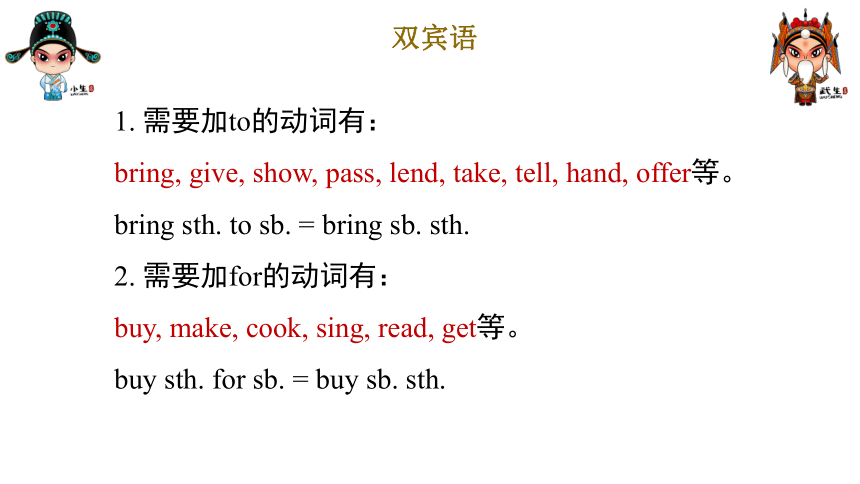

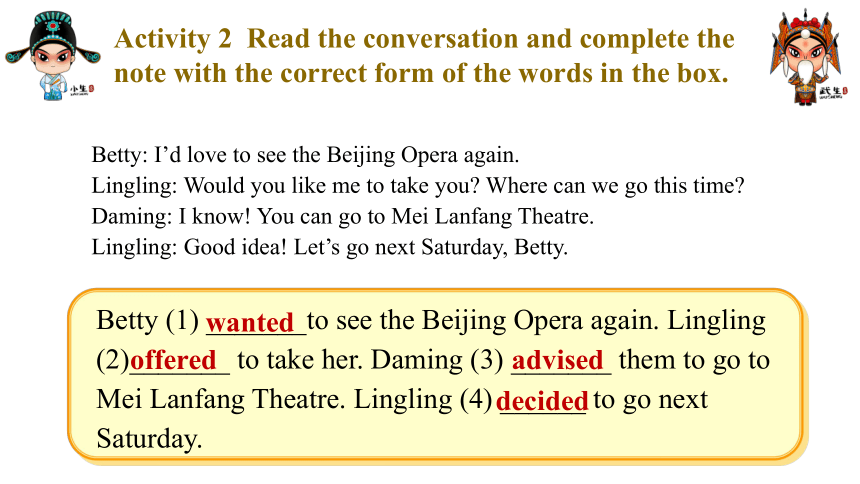
文档简介
(共15张PPT)
Module 5 Lao She Teahouse
Unit 3
Language in use.
描写
学院
普通的
一幕
社会
如果
describe
college
common
act
society
小说
if
展示
show
魔术的
magic
novel
Words revision
女演员
结束
提议
actress
end
offer
We went to the (1) _______ last night to see a play. I had a (2) ________ evening. The play was very good and all the actors were excellent. The story (3) ______________ in a small village in China. It was all about an old box of gold! The box was a (4) _______ box and was difficult to open. The play was very interesting, and everyone (5) _______ at the end of the play!
cheer magic take place theatre wonderful
theatre
wonderful
took place
magic
cheered
Activity 4 Complete the passage.
I gave her a birthday gift.=I gave a birthday gift to her.
双宾语
英语中,有些动词后可接两个宾语,即指人的间接宾语和指物的直接宾语。结构为“动词+间接宾语(sb.)+直接宾语(sth.)”。
或“动词+直接宾语(sth.) +to/for+间接宾语(sb.)” 。一般来讲,for表示“为某人”,而to表示“给某人”。
定义
间接宾语
直接宾语
间接宾语
直接宾语
双宾语
1. 需要加to的动词有:
bring, give, show, pass, lend, take, tell, hand, offer等。
bring sth. to sb. = bring sb. sth.
2. 需要加for的动词有:
buy, make, cook, sing, read, get等。
buy sth. for sb. = buy sb. sth.
双宾语
see spend stay teach write
Do you want to go the teahouse
1. We decided _______ at home because it wasraining.
2. Lao She started ________ Chinese in London in 1924.
3. I tried ________ poems.
4. They plan ______ a film tomorrow.
5. I want ________ my holiday in Beijing.
to stay
to teach
to write
to see
to spend
Activity 1 Complete the sentences .
Betty (1) _______to see the Beijing Opera again. Lingling (2)_______ to take her. Daming (3) _______ them to go to Mei Lanfang Theatre. Lingling (4) ______ to go next Saturday.
Betty: I’d love to see the Beijing Opera again.
Lingling: Would you like me to take you Where can we go this time
Daming: I know! You can go to Mei Lanfang Theatre.
Lingling: Good idea! Let’s go next Saturday, Betty.
wanted
offered
advised
decided
Activity 2 Read the conversation and complete the note with the correct form of the words in the box.
Why not … 为什么不…呢?
Why don’t you do sth. 你为什么不…?
Would you like to do sth. 你愿意…
You’d better (not) do sth. 你最好(不)做某事。
Let sb. do sth. 让某人做某事。
What/How about doing sth 做某事…?
回答:I’d like to. / I’d like to, but…
That’s a good idea. /Sounds great.
提出建议的句型及回答
hope how about let’s want
why don’t we why not would like
A: I want to see Beijing Opera.
B: Why don’t we ...
Pair work
Activity 7 Talk about your weekend plans. Use the words and expressions from the box to help you.
Lu Xun is one of the greatest writers of modern China. He was born in Shaoxing, Zhejiang Province, in 1881. At first, Lu Xun hoped (1) __________ (help) the Chinese people become healthy and strong, so he decided (2) _______ (be) a doctor. After a few years, he started (3) _________ (write) short stories because he wanted (4) ________ (teach) people about society. One of his most famous stories is The True Story of Ah Q. It describes the hard life of Ah Q and makes people (5) ______ (think) about society. In the 1920s, people began to translate his works into English.
to help
to be
to write
to teach
think
Activity 3 Complete the passage with the correct form of the words in brackets.
1. Who is visiting London
a) Vicky b) Steve c) Remoe
2. What are they talking about
a) Romeo and Juliet
b) London
c) Vicky’s parents
Activity 5 Listen and choose the correct answer.
1. Steve went to Shakespeare’s Globe Theatre last night.
2. Vicky offered to take Steve to the theatre.
3. Steve did not try to understand the words.
4. Vicky hopes to see her favorite play.
5. Vicky thinks her parents will take her to the theatre.
Activity 6 Listen again and check (√) the true sentences.
You would find the passage in ______.
a) a book b) a school newspaper c) a magazine
The write_____.
a) liked the play b) did not like the play
c) did not say he liked the play or not
The actors and actresses in the play wore_____.
a) the same clothes as today b) their best clothes
c) clothes of the first half of the twentieth century
Li Nan is ________.
a) a famous actor b) a student c) an actress
Activity 8 Read the passage and choose the correct answer.
Theatres
Western theatre started in Greece, around 600 BC. The theatres were very big. About 15,000 people could watch a play at the same time. The audience sat on stone seats to watch the performances. Some of the theatres survive, as do some of the plays by ancient Greek writers. People still watch these plays today.
before Christ 公元前
同时
石头座位
表演
幸存
像...一样
古代的,古老的
Around the world
THANK
YOU
Module 5 Lao She Teahouse
Unit 3
Language in use.
描写
学院
普通的
一幕
社会
如果
describe
college
common
act
society
小说
if
展示
show
魔术的
magic
novel
Words revision
女演员
结束
提议
actress
end
offer
We went to the (1) _______ last night to see a play. I had a (2) ________ evening. The play was very good and all the actors were excellent. The story (3) ______________ in a small village in China. It was all about an old box of gold! The box was a (4) _______ box and was difficult to open. The play was very interesting, and everyone (5) _______ at the end of the play!
cheer magic take place theatre wonderful
theatre
wonderful
took place
magic
cheered
Activity 4 Complete the passage.
I gave her a birthday gift.=I gave a birthday gift to her.
双宾语
英语中,有些动词后可接两个宾语,即指人的间接宾语和指物的直接宾语。结构为“动词+间接宾语(sb.)+直接宾语(sth.)”。
或“动词+直接宾语(sth.) +to/for+间接宾语(sb.)” 。一般来讲,for表示“为某人”,而to表示“给某人”。
定义
间接宾语
直接宾语
间接宾语
直接宾语
双宾语
1. 需要加to的动词有:
bring, give, show, pass, lend, take, tell, hand, offer等。
bring sth. to sb. = bring sb. sth.
2. 需要加for的动词有:
buy, make, cook, sing, read, get等。
buy sth. for sb. = buy sb. sth.
双宾语
see spend stay teach write
Do you want to go the teahouse
1. We decided _______ at home because it wasraining.
2. Lao She started ________ Chinese in London in 1924.
3. I tried ________ poems.
4. They plan ______ a film tomorrow.
5. I want ________ my holiday in Beijing.
to stay
to teach
to write
to see
to spend
Activity 1 Complete the sentences .
Betty (1) _______to see the Beijing Opera again. Lingling (2)_______ to take her. Daming (3) _______ them to go to Mei Lanfang Theatre. Lingling (4) ______ to go next Saturday.
Betty: I’d love to see the Beijing Opera again.
Lingling: Would you like me to take you Where can we go this time
Daming: I know! You can go to Mei Lanfang Theatre.
Lingling: Good idea! Let’s go next Saturday, Betty.
wanted
offered
advised
decided
Activity 2 Read the conversation and complete the note with the correct form of the words in the box.
Why not … 为什么不…呢?
Why don’t you do sth. 你为什么不…?
Would you like to do sth. 你愿意…
You’d better (not) do sth. 你最好(不)做某事。
Let sb. do sth. 让某人做某事。
What/How about doing sth 做某事…?
回答:I’d like to. / I’d like to, but…
That’s a good idea. /Sounds great.
提出建议的句型及回答
hope how about let’s want
why don’t we why not would like
A: I want to see Beijing Opera.
B: Why don’t we ...
Pair work
Activity 7 Talk about your weekend plans. Use the words and expressions from the box to help you.
Lu Xun is one of the greatest writers of modern China. He was born in Shaoxing, Zhejiang Province, in 1881. At first, Lu Xun hoped (1) __________ (help) the Chinese people become healthy and strong, so he decided (2) _______ (be) a doctor. After a few years, he started (3) _________ (write) short stories because he wanted (4) ________ (teach) people about society. One of his most famous stories is The True Story of Ah Q. It describes the hard life of Ah Q and makes people (5) ______ (think) about society. In the 1920s, people began to translate his works into English.
to help
to be
to write
to teach
think
Activity 3 Complete the passage with the correct form of the words in brackets.
1. Who is visiting London
a) Vicky b) Steve c) Remoe
2. What are they talking about
a) Romeo and Juliet
b) London
c) Vicky’s parents
Activity 5 Listen and choose the correct answer.
1. Steve went to Shakespeare’s Globe Theatre last night.
2. Vicky offered to take Steve to the theatre.
3. Steve did not try to understand the words.
4. Vicky hopes to see her favorite play.
5. Vicky thinks her parents will take her to the theatre.
Activity 6 Listen again and check (√) the true sentences.
You would find the passage in ______.
a) a book b) a school newspaper c) a magazine
The write_____.
a) liked the play b) did not like the play
c) did not say he liked the play or not
The actors and actresses in the play wore_____.
a) the same clothes as today b) their best clothes
c) clothes of the first half of the twentieth century
Li Nan is ________.
a) a famous actor b) a student c) an actress
Activity 8 Read the passage and choose the correct answer.
Theatres
Western theatre started in Greece, around 600 BC. The theatres were very big. About 15,000 people could watch a play at the same time. The audience sat on stone seats to watch the performances. Some of the theatres survive, as do some of the plays by ancient Greek writers. People still watch these plays today.
before Christ 公元前
同时
石头座位
表演
幸存
像...一样
古代的,古老的
Around the world
THANK
YOU
同课章节目录
- Module 1 How to learn English
- Unit 1 Let's try to speak English as much as possi
- Unit 2 You should smile at her.
- Unit 3 Language in use .
- Module 2 My home town and my country
- Unit 1 It's taller than many other buildings.
- Unit 2 Cambridge is a beautiful city in the east o
- Unit 3 Language in use .
- Module 3 Sports.
- Unit 1 Nothing is more exciting than playing tenni
- Unit 2 This year we training more carefully.
- Unit 3 Language in use .
- Module 4 Planes, ships and trains .
- Unit 1 He lives the farthest from school.
- Unit 2 What is the best way to travel.
- Unit 3 Language in use .
- Module 5 Lao She Teahouse.
- Unit 1 I wanted to see the Beijing Opera.
- Unit 2 It descibes the changes in Chinese society.
- Unit 3 Language in use .
- Module 6 Animals in danger.
- Unit 1 It allows people to get closer to them .
- Unit 2 The WWF is working hard to save them all.
- Unit 3 Language in use .
- Revision module A
- Module 7 A famous story
- Unit 1 Alice was sitting with her sister by the ri
- Unit 2 She was thinking about her cat.
- Unit 3 Language in use .
- Module 8 Accidents
- Unit 1 While the car were changing to red, a car s
- Unit 2 I was trying to pick it up when it bite me
- Unit 3 Language in use .
- Module 9 Population
- Unit 1 The population of China is about 1.37 billi
- Unit 2 Arnwick was a city with 200,000 people.
- Unit 3 Language in use .
- Module 10 The weathe
- Unit 1 It might snow.
- Unit 2 The weather is fine all year round.
- Unit 3 Language in use .
- Module 11 Way of life
- Unit 1 In China ,we open a gift later.
- Unit 2 In England, you usually drink tea with milk
- Unit 3 Language in use .
- Module 12 Help
- Unit 1 What should we do before help arrives?
- Unit 2 Stay away from windows and heavy furniture.
- Unit 3 Language in use .
- Revision module B
